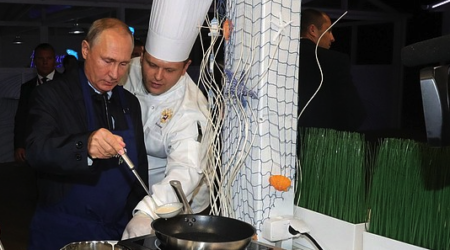Russia appears determined to continue exploiting ongoing ethnic conflicts in the former Soviet space to maintain its self-defined sphere of vital interests.
As Armenia and Azerbaijan seem to be inching toward a comprehensive peace deal through the EU-initiated and US-backed "time-bound and measurable steps", Russia is growing increasingly uneasy, and has recently been accused by U.S. Secretary of State Antony Blinken of "trying to stir the pot".
The conflict between the two neighbours as other Russian-controlled volatile hotspots in many of the former Soviet countries make these countries vulnerable to Moscow's pressure and allows the Kremlin to maintain significant leverage in the entire region.
In one of his longest public appearances since he sent troops into Ukraine on Feb. 24, Russian President Vladimir Putin appeared to be unhappy (what he said below in full) with the progress made through what he called "Washington Treaty", a reference to "time-bound and measurable steps to support the peace process" proposed and promoted by the EU and US over the past months.
Following diplomatic efforts from Brussels and Washington while Russia Russia is distracted with Ukraine, Armenia and Azerbaijan have reportedly made significant progress at high-level meetings in Geneva, Brussels, Prague and Washington to begin drafting the text of a future peace treaty.
When the Soviet Union collapsed in 1991, ethnic Armenian separatists with Russian leftover troops captured Nagorno Karabakh and seven regions around it from Azerbaijan.

Azerbaijan recaptured most of the lost territory, including 7 regions from Armenia in a 44-day war that killed more than 6,000 people on both sides in 2020 but Russia secured a 'peacekeeping mandate', which would likely be disrupted by any peace treaty between Azerbaijan and Armenia.
By portraying itself as the primary mediator, Russia has long sought to undermine Western efforts and direct negotiations between Azerbaijan and Armenia to make sure the two countries stay in its good graces.
Putin implied that a deal proposed by the U.S. would recognize Azerbaijan’s full sovereignty over the entire Nagorno-Karabakh region (it would mean Russian peacekeepers are no longer needed).
“If Armenia shares this view, let it be so,” Putin said in an unhappy tone.
In an apparent hint at pro-Russian opposition in Armenia to derail the Western efforts , he noted Russia would be the one to help Armenia negotiate a better deal that would allow Nagorno-Karabakh to have some "peculiarities" defined in the treaty.
“If the Armenian people and the Armenian leadership believe that Nagorno-Karabakh has some special peculiarities that need to be recognized and reflected in a future peace treaty, it’s also possible. But, of course, we need to negotiate with Azerbaijan. These agreements must also be acceptable to the other side, Azerbaijan. This is a very difficult, to put it bluntly, hard issue.”
Below is what Putin's answer in full, translated from Russian:
"We have been in dialogue with the Armenian side for many years and proposed to resolve the issue related to Karabakh in the following way. After all, Armenia actually controlled seven regions of Azerbaijan, we said: let’s move towards the normalization of relations. There are two districts, Kalbajar and to the south, these corridors are large districts. At some stage, we will agree with the Azerbaijani side – give five districts. They are not needed, they are meaningless, they are simply empty, people left there, they were actually expelled from these territories. Why keep them? There is no meaning. And for communication with Karabakh – two regions, huge by the way, are quite enough.
We believe that it would be fair to return the refugees and so on, this would be a good step towards normalizing the situation in the region as a whole. The Armenian leadership went its own way. As you know, this led to the situation that has developed today.
Now the question of settlement, of a peace treaty. Our position is that this peace treaty is, of course, needed, and we support a peaceful settlement, as well as the delimitation of the border, and the complete settlement of the border issue – we are for it. The question is which option to choose. This is the business of Armenia, the Armenian people and the Armenian leadership. In any case, whichever option is chosen, if it leads to peace, we are all for it.
But we are not going to impose anything, we cannot and are not going to dictate anything to Armenia. If the Armenian people and the current Armenian leadership believe that it is necessary to choose a specific version of this peace treaty… The so-called Washington Treaty, as far as I understand, provides for the recognition of Azerbaijan’s sovereignty over Karabakh as a whole. If Armenia thinks so, then so be it. We will support any choice of the Armenian people.
If the Armenian people and the Armenian leadership believe that Nagorno-Karabakh has some special peculiarities that need to be recognized and reflected in a future peace treaty, it’s also possible. But, of course, we need to negotiate with Azerbaijan. These agreements must also be acceptable to the other side, Azerbaijan. This is a very difficult, to put it bluntly, hard issue.”
But Armenia is our strategic partner, ally, and we, of course, to a large extent, keeping in mind the interests of Azerbaijan, will be guided by what Armenia itself will offer."






